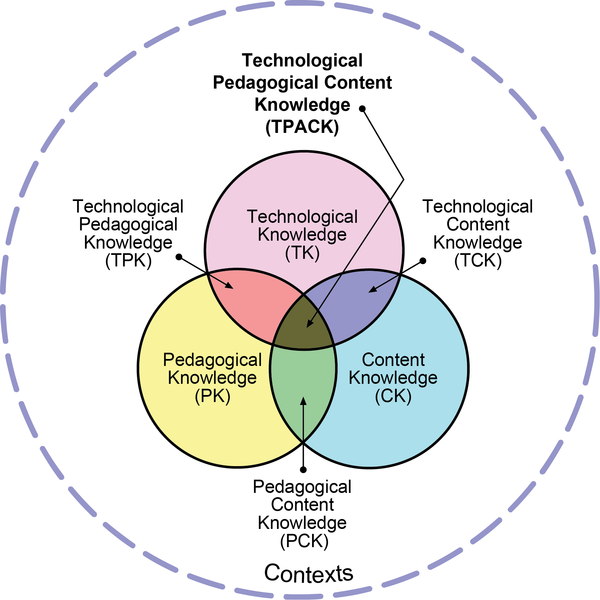TPACK
Introduction
“The technological pedagogical and content knowledge (TPACK) framework presents a way of thinking about effective technology integration, specifically knowledge associated with integrating technology effectively into learning environments. [...] TPACK has the promise to shape the way teacher educators and professional developers prepare teachers to integrate technology (Polly & Mims, in press).” (Polly and Brantley-Dias, 2009:46).
“The basis of good teaching with technology and requir[ing] an understanding of the representation of concepts using technologies; pedagogical techniques that use technologies in constructive ways to teach content; knowledge of what makes concepts difficult or easy to learn and how technology can help redress some of the problems that students face; knowledge of students' prior knowledge and theories of epistemology; and knowledge of how technologies can be used to built on existing knowledge and to develop new epistemologies or strengthen old ones” (Mishra & Koehler, 2006:1029, cited by Barbour, 2009:56).
Below is an official picture dated 2012 from the the Tpack website

In 2018, Mishra (2019) added the context to the model.
The picture now looks like this:
Links
- tpack.org, Homepage of the initiative (started in nov 2012 by Koehler et al.), includes training materials, bibliography, etc.
- TPACK – Technological Pedagogical and Content Knowledge by Matthew J. Koehler (also linked through http://www.tpack.org)
- This website includes tools for practitioners and researchers (e.g. survey instruments), etc.
- Mendely TPACK group
- Note: The TPACK Wiki was closed on May 2011 du to spamming.
- assessment packs (word, links, etc.)
- TPACK (was TPCK) by Puny Mishra.
Bibliography
- AACTE (Ed.). (2008). Handbook of technological pedagogical content knowledge (TPCK) for educators. New York: Routledge.
- Archambault, L., & Crippen, K. (2009). Examining TPACK among K-12 online distance educators in the United States Contemporary Issues in Technology and Teacher Education, 9(1). Retrieved from http://www.citejournal.org/vol9/iss1/general/article2.cfm
- Barbour, Michael; Lloyd P. Rieber, Gretchen Thomas, and Dawn Rauscher (2009). Homemade PowerPoint Games: A Constructionist Alternative to WebQuests, TechTrends 53 (5), 54-59. DOI:10.1007/s11528-009-0326-2
- Bos, B. (2011). Professional development for elementary teachers using TPACK. Contemporary Issues in Technology and Teacher Education, 11(2). Retrieved from http://www.citejournal.org/vol11/iss2/mathematics/article1.cfm
- Graham, Charles R.; Nicolette Burgoyne, Pamela Cantrell, Leigh Smith, Larry St. Clair, and Ron Harris (2009). TPACK Development in Science Teaching: Measuring the TPACK Confidence of Inservice Science Teachers. Techtrends, 53 (5), 70-79. DOI:10.1007/s11528-009-0328-0
- Hammond, T. C., & Manfra, M. M. (2009). Giving, prompting, making: Aligning technology and pedagogy within TPACK for social studies instruction. Contemporary Issues in Technology and Teacher Education [Online serial], 9(2). Retrieved from http://www.citejournal.org/vol9/iss2/socialstudies/article1.cfm
- Harvey, D. M., & Caro, R. A. (2017). Review of Herring, M.C., Koehler, M.J., and Mishra, P. (Eds.) (2016). Handbook of Technological Pedagogical Content Knowledge (TPACK) for Educators. (2nd edition). New York: Routledge. TechTrends, 61(4), 404–405. https://doi.org/10.1007/s11528-017-0176-2
- Herring, M.C., Koehler, M.J., & Mishra, P. (Eds.) (2016). Handbook of Technological Pedagogical Content Knowledge (TPACK) for Educators. (2nd edition). New York: Routledge.
- Hofer, M., & Swan, K. O. (2006). Technological Pedagogical Content Knowledge in Action : A Case Study of a Middle School Digital Documentary Project. Journal of Research on Technology in Education, 41(2), 179-200. http://www.iste.org/
- Koehler, M. J., & Mishra, P. (2008). Introducing TPCK. In AACTE Committee on Innovation and Technology (Ed.), Handbook of technological pedagogical content knowledge (TPCK) for educators (pp. 3-29). New York: Routledge.
- Koehler, M. J., & Mishra, P. (2005). What happens when teachers design educational technology? The development of Technological Pedagogical Content Knowledge. Journal of Educational Computing Research, 32(2), 131-152.
- Lim, C. P. (2009). Formulating guidelines for instructional planning in technology enhanced learning environments. Journal Of Interactive Learning Research, 20(1), 55-74. AACE. Retrieved from http://www.editlib.org/p/24462
- Mishra, P., & Koehler, M. J. (2006). Technological pedagogical content knowledge: A framework for teacher knowledge. Teachers College Record, 108(6), 1017-1054. http://dx.doi.org/10.1111/j.1467-9620.2006.00684.x
- Mishra, P. (2019): Considering Contextual Knowledge: The TPACK Diagram Gets an Upgrade. Journal of Digital Learning in Teacher Education. DOI: https://doi.org/10.1080/21532974.2019.1588611
- Nkwenti Ndongfack, M. (2015). Mastery of Active and Shared Learning Processes for Techno-Pedagogy (MASLEPT): A Model for Teacher Professional Development on Technology Integration. Creative Education, 6, 32-45. http://dx.doi.org/10.4236/ce.2015.61003
- Niess, M. L., Ronau, R. N., Shafer, K. G., Driskell, S. O., Harper, S. R., & Johnston, C. (2009). Mathematics Teacher TPACK Standards and Development Model. Contemporary Issues in Technology and Teacher Education, 9, 4-24.
- Polly, Drew & Laurie Brantley-Dias (2009). TPACK: Where do we go now?,Techtrends, 53 (5), 46-47. DOI:10.1007/s11528-009-0324-4
- Polly, D., & Mims, C. (in press). Supporting the integration of Web 2.0 technologies in professional development programs. In T. Kidd & I. Chen (Eds.), Wired for learning: An educators guide to Web 2.0. Hershey, PA: Information Science Reference.
- Shulman, L. S. (1986). Those who understand: Knowledge growth in teaching. Educational Researcher, 15(2), 4-14. (This is the original)

